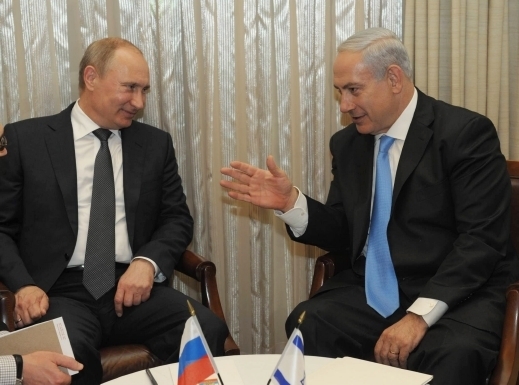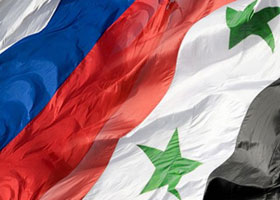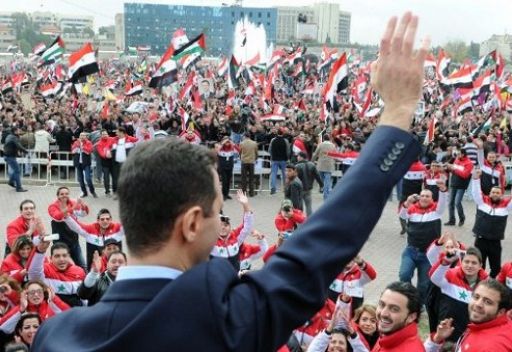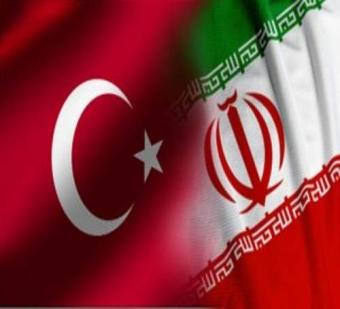"Russia doesn’t want Turkey to act inside Syria, while the Turks are rushing to replace Iran in Damascus. However, Turks won’t get involved in a military adventure in Syria."
Nidal Hamadeh
 During an interposition in "Dans L'air" program presented by the French journalist Yves Calvi on the French TV5, the Israeli Foreign Ministry spokesperson "Yigal Balmur" replied to a question regarding the visit of Russia's President Vladimir Putin to "Israel", stating that Putin discussed the Russian interests in Syria and stressed Russia is not ready to cast aside its interests and existence in that country.
During an interposition in "Dans L'air" program presented by the French journalist Yves Calvi on the French TV5, the Israeli Foreign Ministry spokesperson "Yigal Balmur" replied to a question regarding the visit of Russia's President Vladimir Putin to "Israel", stating that Putin discussed the Russian interests in Syria and stressed Russia is not ready to cast aside its interests and existence in that country.
Thus, Russia doesn't support the current Syrian President Bashar Assad in person, yet it aims at protecting the current Syrian regime. And since Russia didn't find yet any other trustworthy person on the level of saving its interests in Syria, it won't let Bashar Assad down and will try its best to defend him.
"Russia doesn't want Turkey to act inside Syria, while the Turks are rushing to replace Iran in Damascus. However, Turks won't get involved in a military adventure in Syria," added Balmur.
This formula is the bedrock of the international and local game in Syria, where the Western and Gulf pressures turned to demand Al-Assad to step down after previously demanding to oust the Syrian regime.
 Moreover, Moscow rejects this logic sometimes directly, and others indirectly, when saying that the Syrian people are the ones who decide his ruler and determine how to deal with his current president. In this case, Moscow deals with a Syrian reality that couldn't be changed by force, because Moscow's authorities in Damascus aren't strong enough to oblige the president and his cortege to step down. Not to mention, the Syrian cause contributed to re-highlighting the global position of Russia and restoring the power it had lost for around 25 years.
Moreover, Moscow rejects this logic sometimes directly, and others indirectly, when saying that the Syrian people are the ones who decide his ruler and determine how to deal with his current president. In this case, Moscow deals with a Syrian reality that couldn't be changed by force, because Moscow's authorities in Damascus aren't strong enough to oblige the president and his cortege to step down. Not to mention, the Syrian cause contributed to re-highlighting the global position of Russia and restoring the power it had lost for around 25 years.
Everybody is seeking Moscow’s consent, starting from Obama administration and the presidents of France, Germany and Britain, as well as the Gulf countries. This overall international power resulted from the Syrian crisis. Moscow neither did pay a single ruble nor did shoot a bullet, or did send a single soldier to the battlefield, but rather its power had resulted from the coherence of its ally, the Assad’s regime. If the regime was weak, the West wouldn’t have let Russia to act in Syria, but rather it would have repeated what happened in Libya without Moscow being able to do any action.
In this concern, a Syrian opposition source quoted a French official he met as saying that when the Russians talked to President Bashar Assad about the Arab League project to apply the Yemeni model in Syria, he strictly refused the idea, saying: “No one in the world can oblige me to do what I don’t want to do.”
 It is the formula of the power and the ability of the Syrian President to stay strong, coherent and supported by a vast majority of the Syrian people, as well as the army and the diplomats of his country. This is the formula that keeps him the unreachable player in this game on whom his Russian ally cannot compromise. This compromising cannot be implemented for simple reason, i.e. when Moscow demands from Assad what he doesn’t agree upon, Russia will shortly lose every influence and international attention it gained, especially its UNSC veto. Russia, however, is neither due to pressure for the Assad’s resignation, nor is able to force him to do so. It has no trustworthy ally but him to protect its presence and interests in Syria.
It is the formula of the power and the ability of the Syrian President to stay strong, coherent and supported by a vast majority of the Syrian people, as well as the army and the diplomats of his country. This is the formula that keeps him the unreachable player in this game on whom his Russian ally cannot compromise. This compromising cannot be implemented for simple reason, i.e. when Moscow demands from Assad what he doesn’t agree upon, Russia will shortly lose every influence and international attention it gained, especially its UNSC veto. Russia, however, is neither due to pressure for the Assad’s resignation, nor is able to force him to do so. It has no trustworthy ally but him to protect its presence and interests in Syria.
As for the Iranian formula, on which the Syrian regime also relies especially in the Russian case, Moscow, being aware of the Iranian power in Syria, seeks being a partner to Iran however it is possible, while Tehran presses on Moscow to continue supporting the regime and the president by which its position represents the key element that saves the regime. The Syrian President pre-empted the Geneva meeting upon announcing his rejection to any non-Syrian solution for the Syrian crisis. It is noteworthy that his announcement was broadcast on an Iranian media outlet.
 This Iranian formula which Turkey wants to end in Damascus, considers Russia an ally since it worries from the Turkish power in the past Soviet Asia. The Russians, returning with an Orthodox Church power, hold a thousand years of conflict on interests with the Turks since the downfall of the Orthodox Constantinople, knowing that the Orthodox Greece and Cyprus are the bitterest enemies of Ankara in the region. Moscow considers that Turkey is launching an aggressive war and economic blockade against it via signing “Nabucco” natural gas pipeline agreement with the West in order to transport the gas from Turkmenistan and the countries surrounding the Caspian Sea to Turkey, then to Austria via Bulgaria and Hungary, while avoiding passage through the Russian land, which aims at reducing the West’s reliance on the Russian gas.
This Iranian formula which Turkey wants to end in Damascus, considers Russia an ally since it worries from the Turkish power in the past Soviet Asia. The Russians, returning with an Orthodox Church power, hold a thousand years of conflict on interests with the Turks since the downfall of the Orthodox Constantinople, knowing that the Orthodox Greece and Cyprus are the bitterest enemies of Ankara in the region. Moscow considers that Turkey is launching an aggressive war and economic blockade against it via signing “Nabucco” natural gas pipeline agreement with the West in order to transport the gas from Turkmenistan and the countries surrounding the Caspian Sea to Turkey, then to Austria via Bulgaria and Hungary, while avoiding passage through the Russian land, which aims at reducing the West’s reliance on the Russian gas.
As for Russia, it intervened with Turkmenistan which retracted the agreement so that it shifted to Azerbaijan nearby Iran. In this case, the Russian-Iranian interests oppositely intersected with Turkey on the levels of gas, missile defense, and Syria that shot down a Turkish Phantom by a Russian “Pantsir 51” radar-controlled machine gun, according to well-informed French references.
To read the Arabic version of this article click here
Disclaimer:
Al-Manar is not responsible for the content of the comments. All opinions expressed are those of the posters not Al-Manar’s or its staff.